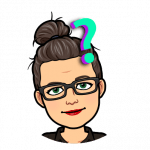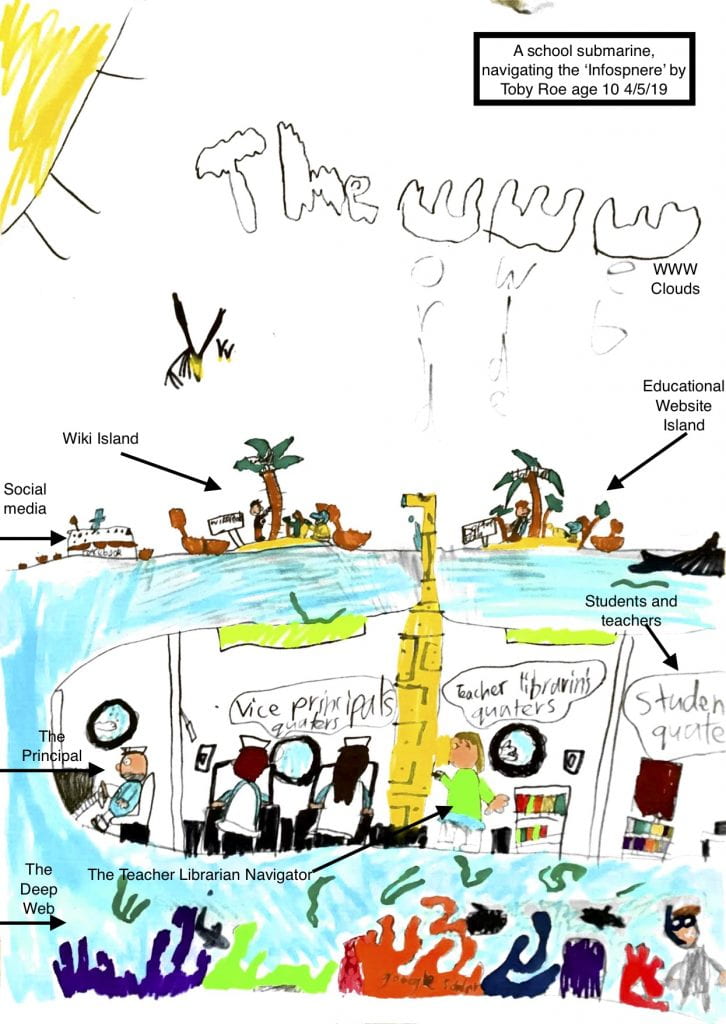Following my ‘pass’ on my Discussion Essay (Assessment 2) for Introduction to Teacher Librarianship (ETL401) I had another look through the forum posts for Module 2 from my colleagues this week and I wrote notes of my thoughts as I went along:
INFORMATION: A school context must come to an agreed understanding to a definition of, opinions of, and methods for seeking and absorbing information. Thus, we will have a better understanding of what is an ‘information specialist’ or ‘information literacy’ or ‘information (insert word here)’.
MULTI-LITERACIES: Back in my UWS studies in 2003-2006, we didn’t learn much about how to implement Guided Reading groups using PM Readers (ugh, I despise this method of teaching anyway) but we did a fair amount of study around ‘multi-literacies’ (Lilly & Green 2004 p.99 & 118, Worthington & Carruthers 2003 p.12, Arthur 2001, & Barratt-Pugh & Rohl 2000 p. 198-201).
[Sidebar: In fact, in my NSW Department of Education (DET) job interview in 2006, I was asked how I would implement my English program and when I answered academically, with my knowledge of ‘multi-literacies,’ I failed the interview and was told to do another practicum in a primary school (although that was not officially a requirement of the DET) in order to ‘pass’ my interview and be granted a teacher number. The head of the panel, a high-school principal, was worried that I wouldn’t implement the traditional Australian primary school English content and would create a generation of illiterate students, I suppose. Thankfully, I did as she asked and got the job easily the second time around…interesting how ‘multi-literacies’ has come full circle in the form of ‘information literacy’ as well…but I digress.]
GOING GLOBAL: Information has become more global, as has our society, with the introduction of digital technologies and the ‘world wide web.’ This means that we, as Teachers and Teacher librarians must be more flexible with our students as global citizens, acknowledging and integrating: multiple languages, multiple cultural norms, multiple methods of information seeking, multiple methods of information absorption (aka ‘learning’), multiple learning styles (that change depending on an individual person’s context in any given moment in their lives) and multiple ability levels.
 Is information that is globally available, much like the fancy car that a rich family buy their inexperienced teenager, less valued? If it comes too easily will it get taken for granted and generally end in a car crash?
Is information that is globally available, much like the fancy car that a rich family buy their inexperienced teenager, less valued? If it comes too easily will it get taken for granted and generally end in a car crash?
SOCIAL MEDIA: The global network has also seen the creation of ‘social media’ and ‘wiki’ spaces. This impacts on people’s learning because, while social media is an excellent tool for engagement and delivery of information (linked to the research and marketing analytics done by corporations on how to reach target audiences–particularly children as per Veltri, et al 2016), social media is a weak platform in which to apply knowledge to every day reality. It is a sub-reality. A false replication of actual society with real, living and breathing humans and human interactions.
This is evident in any situation where someone makes an educated statement on a social media platform and is then hit with a barrage of abusive comments. People on social media platforms go on to social media platforms in order to be ‘social’–they aren’t there to be educated and aren’t open to absorb information, particularly if they have to work for it or if said information puts them out of their comfort zones and into a learning pit.
NAVEL GAZING: I wonder if the prevalence or demand for self expression on social media has been  born from the American talk show and self-help movement? Much like these movements who focus ‘in rather than out,’ (Murray 2015) could social media confuse the lines of what is a therapy tool, versus valuable information or accurately tested and researched knowledge?
born from the American talk show and self-help movement? Much like these movements who focus ‘in rather than out,’ (Murray 2015) could social media confuse the lines of what is a therapy tool, versus valuable information or accurately tested and researched knowledge?
ACADEMIC SOCIAL MEDIA: When we blend academia with social media, do we then, in turn, blur lines of authenticity for students? Why are some blogs academic and some mere musings? Is the blurring of academic information being part of the deep web versus readily available on the internet a clever way of engaging students in academia, embracing the method of delivery preferred by 21st century learners?
EASY TO FIND OVERLOAD VS RESTRICTED ACCESS DEEP WEB: Both are problematic. Historically, libraries have suffered the weight of hoarding and politicalisation of information. Encyclopaedia Britannica have a great topic page on their website (El-Abbadi 2019) about the Library of Alexandria which details how the Royal library and its ‘daughter’ library the Serapeum were destroyed by fire and war.
Great swaths of information have been destroyed in the past, and in today’s global information network, we are drowning in misinformation, irrelevant information, and less connection to information.
We are slightly more organised on the deep web, which is less susceptible to misinformation, but more likely to segregate and discriminate against users, particularly to society’s lower classes.
THE TL ROLE: In order to be valued as TL who are information specialists, we are the navigators and we need tools like telescopes, compasses and maps to help the ship navigate the ‘infosphere’ (Floridi 2007). We must safely navigate towards islands of internet information and cruise ships of social media. We must safely navigate below the water, helping the ship find and understand the underwater volcanoes and creatures of information.
TL’s need to:
- remember how to use digital technologies
- but to still keep in mind that using social media for work purposes is like working while on holiday, particularly for some teachers and teacher librarians who are suffering from stress or burnout, or who are trying to stabilise their work/life balance and
- we must strive to enable students to go through the stages of the Learning Cycle,
- use evidence-based practice,
- be aware of theories and pedagogies that we have been using as teachers, such as Multiple Intelligences and/or the Berry Street Educational Model (BSEM) for trauma informed practice or Quality Teaching Rounds, and
- work collaboratively with all stakeholders, much like the crew of a submarine!

Teacher Librarians need to be the navigators of the (school) submarine. The principal and executives are the captain and first mates. The teachers are the crew and the kids, the families are the passengers. The submarine needs everyone to work together in order to be able to navigate the information sea above the water, including the political breezes and cultural water currents, the social media cruise ships and the various modes of information islands. It also needs to be able to safely navigate below the sea in the deep web with all of the volcanic deep web databases, applications and sea creatures that lurk about in the darkness.
References:
Arthur, L. Young children as critical consumers. Australian Journal of Language and Literacy. Oct 2001. v24. i3. p.182(14).
Barratt-Pugh, C. & Rohl, M. (2000). Literacy learning in the early years. Sydney: Allen & Unwin.
El-Abbadi, M. (2019). Encyclopaedia Brittanica. Retrieved from www.brittanica.com/topic/library-of-alexandria
Floridi, L. (2007). A look into the future impact of ICT on our lives. The Information Society, 23, 59-64. CSU Library.
Lilly, E. & Green, C. (2004). Linking Home and School Literacies. Developing partnerships with families through children’s literature. NJ: Pealson.
(2015) Notes to self: the visual culture of selfies in the age of social media. Consumption Markets & Culture, 18:6, 490-516, DOI: 10.1080/10253866.2015.1052967
Worthington, M. & Carruthers, E. (2003). Children’s Mathematics: Making Marks, Making Meaning. London: Paul Chapman Publishing.
Veltri, G. & Lupiáñez-Villanueva, F. & Gaskell, G. & Theben, A. & Folkvord, F. & Bonatti, L. & Bogliacino, F. & Fernández, L. & Codagnone, C. (2016). (Radboud University) Study on the impact of marketing through social media, online games and mobile applications on children’s behaviour. Published by Luxembourg: Publications Office of the European Union. DOI: 10.13140/RG.2.1.2576.7280.
